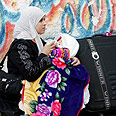

There is also evidence of mounting recreational drug use as Gaza drifts in limbo, with no clear political future.
Gaza residents reported health problems after a 22-day Israeli offensive last January, with most citing psychological problems and stress, according to a survey published by the United Nations Gender Task Force on April 21.
"With increased trauma and stress and limited access to professional psychosocial services, there is a rising problem of self-medication with unsupervised pharmaceutical therapies among the Gaza population," said a summary presented in Jerusalem.
One eighth-grade teacher, speaking to Reuters on condition of anonymity, said she recently found several 13-year-olds using tramadol hydrochloride, a strong painkiller sold under the brand name Tramal which is now drug of choice in the Gaza Strip.
A boy had stolen the drug from his parents' room and passed it to friends, unaware of its potency or the risk of addiction.
A synthetic opioid developed by German company Gruenenthal in 1977 to treat moderate to severe pain, Tramal has caught on among Gaza high school students, male and female, said Islam Shahwan, a Hamas police spokesman.
There are rich profits to be made on drugs which pharmacists and other traders say can be smuggled in through tunnels from Egypt and sold for several times the purchase price.
"Every kind, anything you want, comes through the tunnels that are still functioning," said Salim, a doctor and pharmacist who declined to give his full name, referring to a crackdown on the supply tunnels.
Palestinians say some 1,400 people including 926 civilians died in Israel's war from Dec. 27 to Jan. 18 against Hamas-led Islamist militants in the Gaza Strip.
Israel, which launched the offensive to halt daily salvoes of short-range rockets from Gaza, says most of the dead in its own tally of 1,166 Palestinians killed were fighters.
Besides extensive destruction, the bombing has added to Gaza's problems of poverty, unemployment and overcrowding.
"To deal with depression here in Gaza, many take these drugs, especially youths who've lost their jobs, who sit at home and don't have a salary," said Taysir Diab, a psychiatrist at the Gaza Community Mental Health Programme (GCMHP).
Tramal pills at 100 mg doses sell for NIS 25 (about $6) for a box of 10. Besides Tramal, pharmacists named Elatrol (amitriptyline hydrochloride) and older antidepressants such as Valium (diazepam) and Anafranil (clomipramine) as commonly used.
Also popular – and much more expensive – is a mystery pill stamped "$". Mental health professionals say addiction is rife.
Easy to get
Turning to tranquillizers and other self-medication is not uncommon in response to the chaos of war: for example in besieged Sarajevo and other cities in the Balkan conflicts of the 1990s, when normal regulations broke down.
Gaza lacks professionally trained psychiatrists and psychologists, said GCMHP president Eyad el-Sarraj. Doctors with limited knowledge often prescribe medication for the physical symptoms of psychosomatic problems.
But controls over the drugs are also loose.
"The law makes it clear that drugs of this kind should not be given to people without a prescription," said el-Sarraj. "But there is no control of this so people can go and buy over the counter any drug they want."
Salim said Gazans' consumption of anti-anxiety drugs and anti-depressants had risen dramatically.
"During the war people were tense, afraid, and they lacked the ability to concentrate," he said. "The situation continued after the war because of the continued state of internal division and the possibility of a renewal of war."
Israel withdrew from Gaza in 2005, handing it over to native Palestinians. In 2007, Islamists led by Hamas, which rejects peace with Israel, wrested control of the territory from the Fatah group which is seeking a peace deal with the Jewish state.
Prospects of lifting the Israeli embargo depend on healing the Palestinian split, but so far talks to this end have made no substantial progress.
Once in control, Hamas banned sales of natural opioids, but failed to regulate synthetics like Tramal, which its police began to encounter during raids on drug dealers.
"We have discovered from investigations and interrogations that some drug addicts take Tramal in large doses and big quantities when they do not find (opiate) drugs," said Hamas police spokesman Shahwan.
"I know a case where one went into a coma," said Nabil Abu Dalal, a pharmacist at the GCMHP. "He'd taken 1,000 mg of Tramadol in a single dose."
Profits to be made
The Hamas-run health ministry recently renewed instructions not to sell medication without prescriptions and to enforce the rule, Shahwan said policemen disguised as youths tested city pharmacies.
"We detained some pharmacists for illegally selling Tramal," he said. "We released them soon after they made pledges not to sell it. Unfortunately, it is still being sold privately."
Psychiatrist Diab said improved and prolonged sexual performance, a side effect of Tramal and similar drugs, adds to their popularity among young married men between the ages of 18 and 30.
"Police have warned merchants and tunnellers against smuggling Tramal and other drugs and we have confiscated thousands of boxes," Shahwan said.
The pill with a dollar sign stamped into it is called Sa'ada (Arabic for pleasure). It is smuggled through the tunnels and sold on the black market in Gaza, but neither its composition nor its manufacturer is known, said Abu Dalal.
Though it is not widespread like Tramal, a dose of Sa'ada can cost from NIS 50 to 100, he said.
Sameh the merchant said he spends NIS 500 ($120) a month on Tramal and other similar drugs. "It makes me feel good," he said. "I forget my problems for some time."
"I hope this will have some end, but I doubt it," said GCMHP president el-Sarraj. "I think that we have to brace ourselves for even more serious problems."















